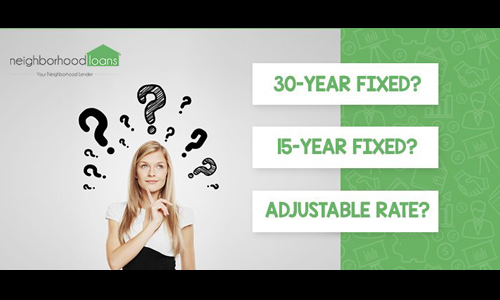
Whether you are buying your first home, second home or even your vacation home, you will need assistance from a mortgage lender. A mortgage lender analyzes applicants by reviewing their credit history, employment status, current debt and other personal factors.
The main goal for lenders is to provide borrowers a loan they can financially manage so they can purchase their dream home. The mortgage process requires special attention and specific steps to be followed. Some people can feel overwhelmed and their minds begin to wander at 100mph. Before you start believing everything you read on the Internet, we have busted the top mortgage lending myths that will make your lending process easier.

Myth #1: You need to have perfect credit to qualify for a mortgage
Everyone’s financial situation is different.
Every has a different set of financial responsibilities, amount of income and debts they need to manage. Which also directly influences your credit score.
Credit scores can range anywhere from 300 to 850 that reflects your credit risk.
All this means is what is the likelihood you are to pay back your credit obligations you agreed upon.
If you have missed a payment, have large amounts of debt or open new lines of credit in a short period of time, you can negatively impact your credit score.
Your mortgage lender will request a credit report from one of three major credit bureaus. Any of the three will send your lender your most recent credit report which will contain the following information:
- Payment history
- Amount of debt
- Length of credit
- New credit
- Variety of credit
Lenders factor in other information as well, but, credit scores can impact the type of loan under rates you can qualify for.
However, the higher your credit score, the better the mortgage rate.
Nothing in life is ever perfect, which is why the need to have a perfect credit score is false.
There are different loan options available to accommodate to those who have lower or higher credit scores.
Your lender will evaluate your overall financial situation to determine your eligibility to qualify for a loan.
ent set of financial responsibilities, amount of income and debts they need to manage. Which also directly influences your credit score.
Credit scores can range anywhere from 300 to 850 that reflects your credit risk.
All this means is what is the likelihood you are to pay back your credit obligations you agreed upon.
If you have missed a payment, have large amounts of debt or open new lines of credit in a short period of time, you can negatively impact your credit score.
Your mortgage lender will request a credit report from one of three major credit bureaus. Any of the three will send your lender your most recent credit report which will contain the following information:
- Payment history
- Amount of debt
- Length of credit
- New credit
- Variety of credit
Lenders factor in other information as well, but, credit scores can impact the type of loan under rates you can qualify for.
However, the higher your credit score, the better the mortgage rate.
Nothing in life is ever perfect, which is why the need to have a perfect credit score is false.
There are different loan options available to accommodate to those who have lower or higher credit scores.
Your lender will evaluate your overall financial situation to determine your eligibility to qualify for a loan.
Myth #2: If you prequalify for a mortgage, you automatically get the loan
It is strongly recommended for future homebuyers to get prequalified for a mortgage loan before they start touring homes.
However, just because you prequalify does not necessarily mean you get the loan.
The mortgage pre qualification process intends to give prospective buyers a general idea of how much they can afford based off their credit and debt-to-income ratio.
If you are in the market to buy a home, it is a good idea to know how much you can spend comfortably without setting yourself back. And the best and easiest way to figure out your spending limit is by talking with your mortgage lender. Your mortgage lender will analyze your financial situation, in addition to other personal information, such as your W-2’s, copies of pay stubs, social security number and other documents. Once you have an appointment scheduled with your lender, make sure you don’t show up empty handed and bring all the necessary paperwork to get this process started.
All of this information is required during the pre qualification process, so your lender can appropriately determine your eligibility for a particular loan.

Myth #3: Mortgage payments should equal to 28 percent of your income
Paying monthly mortgage payments should be based off what you are most comfortable with.
It does not need to meet a specific percentage because every mortgage is handled differently.
There are other expenses that need to be covered in addition to your mortgage payments, such as other regular monthly expenses like utilities and electricity, maintenance costs and debt you already owe, like credit card or car loans.
Basing what you can afford monthly should not be calculated based off your income necessarily, but more on how much you spend comfortably, while managing other expenses.
If you want to start tracking and budgeting your money so you can see how much you can afford monthly, you can use online resources, such as:
To accurately determine what you can afford monthly, you can ask your lender to calculate several scenarios of potential loan options or use online tools.
Myth #4: You must make a 20 percent down payment to purchase a home
Generally, it is financially smart to pay as much as you can up front when you are buying a home. The more you put down, the lower your monthly payments will be.
The amount you put down also influences how much interest you will pay over the lifetime of your loan. More so than not, mortgage professionals will advise buyers to put down 20 percent. However, depending on the type of loan you qualify for, can require a different amount.
For example, the Federal Housing Administration (FHA) loan allows qualified buyers to put down as little as 3.5%. The Department of Veterans Affairs (VA) loan requires no down payment for qualified applicants.
In some situations, your income and credit can make your eligible for a different loan that requires a down payment less than 20 percent of the home’s market price.
Although it is encouraged to put down 20 percent of the home’s purchase price, it is not mandatory to do so.
What is mandatory to understand is why the amount you put down matters.
The number one reason why putting down at least 20 percent is reiterated is to reduce monthly mortgage payments and avoid paying private mortgage insurance (PMI).
If you plan on paying less than 20 percent, some lenders require borrowers to purchase PMI, which is a monthly insurance fee that protects the lender if the borrower stops making payments.
To avoid paying thousands of dollars extra in an insurance plan that does not cover your home, consider saving up enough your a 20 percent down payment.

Myth #5: 30-year fixed-rate mortgages are the best option
Although a 30-year fixed-rate mortgage offers lower monthly payments, that does not necessarily mean it is the best option for everyone.
Depending on how much you can afford monthly and how long you see yourself living in the home, it can influence your decision of which mortgage rate you will choose.
If you can afford to pay more monthly, a 15-year fixed-rate mortgage may be more suitable for you. This option can also save you thousands of dollars in interest over the life of the loan.
Another option that is offered by lenders is an adjustable-rate mortgage. This interest rate has the ability to fluctuate periodically depending on current market conditions.
For example, if your rate goes up, so does your monthly payments, and vice versa, if your rate goes down, so do your monthly payments. Before deciding on a mortgage rate, compare the pros and cons of paying off a shorter versus longer term and whether a fixed-rate or an adjustable-rate mortgage will be more appropriate for you.
Myth #6: It’s always better to own than rent
It has been proven that owning a home can offer different advantages that you can’t get with renting.
For example, homeownership gives people privacy from neighbors, luxurious space, ability to build equity and freedom to do what you want with the property.
Renting on the other hand, gives people reassurance their landlord will handle all maintenance issues, it is a short term commitment and no costly down payment is required. Renting also sometimes offers some “free” amenities, such as access to a pool or gym.
Not only are the living circumstances different, but how it is financially managed differs too.
Financially affording a home entails paying a down payment, insurance fees, homeowner’s association (HOA) fees, maintenance expenses, utility bills and other obligations.
Renting finances requires an initial security deposit, paying monthly rent, fewer maintenance costs, utility bills and other requirements.
If you are on the fence of whether you should buy or rent, check out this article that weighs both sides.
Depending on your financial situation and what your current aspirations are can help determine whether it is better to own or rent. Only you can decide whether the benefits of owning or renting will financially and physically benefit you.

Myth #7: You can compare mortgage rates based off their advertisements
The main purpose of an advertisement is to capture people’s attention with a straightforward message.
Mortgage lenders in particular, have perfected this art.
They continuously draw people in by advertising their low mortgage rates. Prospective buyers are always in the market for good deals as financing a home is one of the biggest investments of their lives.
Which is why lenders across the board are marketing low rates to gain business.
Sure, lenders may actually have low rates, but what they aren’t advertising is the other fees and charges that will require borrowers to pay.
Be sure to pay close attention if lenders are advertising interest rates or annual percentage rates (APR).
These rates can include other fees and mortgage points, which are fees paid directly to the lender at closing in exchange for lower interest rates.
Regardless, all mortgages have different fees and costs.
It is extremely important to compare all lenders and familiarize yourself on their mortgage rates, so you can make the best decision possible.
